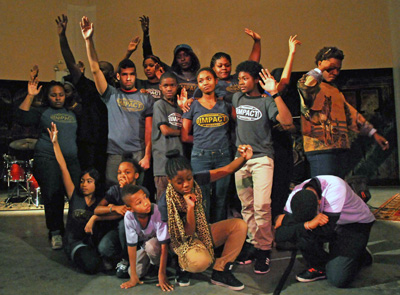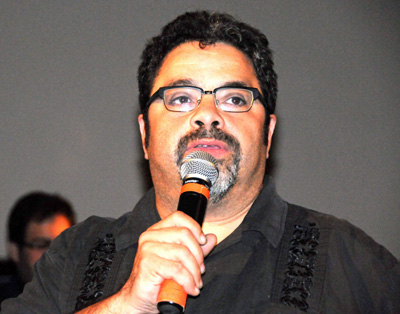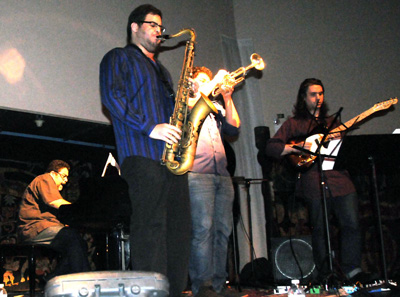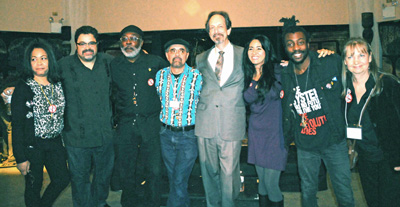An Evening of Beats, Rhymes and Rhythms
Against the Slow Genocide of Mass Incarceration
December 1, 2013 | Revolution Newspaper | revcom.us
On Friday, November 22, the National Black Theater of Harlem hosted a benefit, featuring Grammy-winning jazz musician Arturo O'Farrill, to raise money for the STOP Mass Incarceration Network (SMIN).

Members of Impact Repertory Theater Performance Company, a youth arts program in Harlem that combines art and activism.

Arturo O'Farrill
About 150 people came out for what was to be an amazing night. This was a very diverse crowd—Black, white, Latino, and Asian, young and old, people from the projects along with middle-class people, students, activists, and revolutionaries. A host committee of 17 people—including Dr. Cornel West, journalist Herb Boyd, Mimi Rosenberg, actor Gbenga Akinnagbe, and Dr. Antonia Cedrone, along with longtime committed antiwar and anti-repression activists, professors and others—threw in to make the event a success. The STOP Mass Incarceration Network (SMIN) had called for fundraising to enable the network "to enter 2014 on the offensive to reach millions, change the way people view mass incarceration, and bring many of them into this movement." People from all walks of life stepped up to this call in beautiful and inspiring ways—raising funds, lifting spirits, and creating art that celebrated resistance so urgently needed in these times.
Beautiful cards were created to promote the event with this quotation from Arturo O'Farrill:
..In my own small way, I'll use my voice, I'll use what I have, the platform that I've built, the orchestra, the music, the records, the composing, everything I can do, I aim towards the purpose of letting people know that things have got to change. It is the most important thing a person can do.
— Arturo O'Farrill
Welcomes were given by Alejandrina from STOP Mass Incarceration Network, who spoke in English and Spanish, and by Nabii Faison, the director of the National Black Theater. The Reverend Stephen H. Phelps of Riverside Church co-mc'ed with Jamel Mims of the NY Revolution Club and the STOP Mass Incarceration Network.
Arturo O'Farrill's Music and Words

Arturo O'Farrill's band

Arturo O'Farrill (second from left) with members and supporters of the Stop Mass Incarceration Network, including Carl Dix, Travis Morales, Rev. Stephen Phelps, and Jamel Mims (third, fourth, fifth and seventh from left)
All Photos: Li Onesto/Revolution
Arturo O'Farrill's performance was the culmination and centerpiece of the evening. O'Farrill is a world-renowned, two-time Grammy award-winning jazz composer and performer. Dedicated to musicians, he devotes tremendous attention to music training and education and working with young musicians. He performed with a six-piece band that came together for this night, including two of his sons.
Before playing, O'Farrill spoke movingly about what brought him there. He told about becoming a jazz musician, getting more and more well-known, playing on bigger and bigger stages, winning awards, yet feeling that more was required. He said: "Artists have a responsibility to report back to the people what is going on in the world. And what I saw in the world was freaking me out." He talked about the NYPD murder of Ramarley Graham in the bathroom of Graham's house—and how his own son was the same age at that time, and he knew he had to speak out.
He said, "We live in a horrible age, we live in a terrible police state." But still, "I was one of those people who thought, 'What can I do? I'm just a musician.'" But he came to the conclusion that his music and his renown could be a platform to influence other people, and that now he has to do all he can to bring the message of change through his work and voice.
Arturo O'Farrill's band did an extended set of incredible music. Jazz aficionados and those who knew nothing about jazz all came away deeply moved. His set included a mournful and painful "prayer" for the families who have lost children to police brutality, which then segued into the urgent chaos and conflict of Arturo's "Stop and Frisk Blues" followed by a moving lyrical piece, “The Moon Follows Us Wherever We Go” composed by his son, Adam O'Farrill. Arturo O'Farrill described how his father (the famous jazz artist Chico O'Farrill) and his family of musicians have all believed in erasing the boundaries between different kinds of music, and he powerfully transcended categories to reach inside people, grabbing hold of the pain and rage as well as a lyrical humor and soaring beauty.
Near the end of his set, O'Farrill spoke about what holds back other artists from taking a stand, noting that once he started to do this, "People on Facebook and critics were panning my albums for referring to AmeriKKKa—triple K." He alluded to pervasive government spying and repression. He said that "not enough of us in the jazz community speak out. I know a lot of jazz musicians are lovely people... but we're scared, because if you speak out... you can get in a lot of trouble.
"But that's no excuse."
Other Highlights of the Evening
The program leading into Arturo O'Farrill's performance was begun by the Reverend Phelps, who told of being asked to join Carl Dix and Cornel West in getting arrested two years ago to put their bodies on the line to stop the NYPD stop-and-frisk program. He spoke of the prisons and of being in the Ninth Ward of New Orleans after Hurricane Katrina. Drawing from this, he spoke of the moral necessity to act to stop mass incarceration: "It's going to take a long time—it's going to take people putting their lives on the line, because the systems and structures of power do not change without that, but if enough people do that, they cannot stand against it."
Carl Dix—co-founder of SMIN and a member of the Revolutionary Communist Party—spoke of the mass incarceration, stop-and-frisk, racial profiling, police murder, and all the other manifestations of what he described as "a slow genocide that could easily speed up," and he challenged the audience to be part of ending this: "Out of tonight a message has to emanate, not only throughout the city but throughout the country, the whole society. No more to mass incarceration. No more to 2.2 million people in prison. No more to 80,000 of those in prison being subjected to the torture of solitary confinement. No more to the five million former prisoners being treated as second-class citizens in this society. No more to Black and Latino youth being treated as criminals by police, guilty until proven innocent... if they can survive to prove their innocence. No more stop-and-frisk. No more 'Driving while Black. No more police swarming people for the crime of walking while Black, or—this is racist vigilantes doing this—for the crime of going to the store for Skittles and iced tea while Black, or searching for help after an auto accident while Black. To say 'No more' and mean it means we have to bring forward a movement of millions from all different backgrounds who are involved in saying no more to these abuses, and saying it and meaning it."
Dix said, "Through revolution, we can get rid of this system and end the slow genocide of mass incarceration and all the other horrors it enforces on humanity—the attacks on women, the wars for empire, the devastation of the environment and more." He said that there is the leadership needed for this revolution in Bob Avakian, BA, Chairman of the Revolutionary Communist Party, USA: "BA has studied the experience of the previous revolutionary societies and developed a new approach to revolution and communism. We have a plan and strategic approach to getting ready and in a position for such a revolution in a country like this. And we are building a movement for revolution."
The humanity of the criminalized generations and those lost to police murder was alive in the house, drove the performances, and they were named on the stage: 19-year-old Renisha McBride, murdered by a shotgun blast to the head when she sought help from a Dearborn, Michigan, homeowner after a traffic accident; the victims of "shop-and-frisk" in NYC—Black people arrested in department stores for making purchases that store security deemed "too expensive" for Black people. Juanita Young and Nicholas Heyward Sr., who both lost sons to police murder and have fought for many years for justice and to stop police brutality, were in the house and recognized from the stage. The felt loss of Ramarley Graham and Trayvon Martin, and the outrage unleashed and the injustice of their killers being set free by the "justice" system, wove through the performances and the anger of the audience. And the audience gave a lot of love and appreciation to Carl Dix, Noche Diaz, the Reverend Phelps, and others who came together two years ago to begin the mass civil disobedience to STOP stop-and-frisk and build the resistance that has begun to take shape to STOP all the police brutality, mass incarceration, and criminalization of a generation.
Jamal Joseph spoke preceding the performance of the IMPACT Repertory Theatre, which he founded. Joseph is a former Panther, author of Panther Baby; A Life of Rebellion and Reinvention, and a Columbia University professor. IMPACT is a company of Black youth of all ages who come together to use their art to "change the world in a positive way." Jamal Joseph spoke with a forceful eloquence of the necessity for militant resistance to oppression. When he asked the 20 members of the IMPACT group who were arrayed in silent tableau behind him how many of them had relatives who were in or had been in prison, all of them raised their hands. Then the troupe—kids of every age, shape, and size—performed songs and raps of their own words in choreographed numbers that captured not only the energy of the streets, but also the sense of collective strength and joy that comes from commitment to resistance to the day-in and day-out oppression of this system.
An ensemble of actors read excerpts from letters that prisoners have written to the Prisoners Revolutionary Literature Fund, traversing the ground from a 32-year-old prisoner who said, "I will likely die here, in this cell" but who was looking forward with hopeful anticipation to the statewide prisoner hunger strike in California, through the growing unity of prisoners of all nationalities during that strike, and the growing consciousness of the roots of mass incarceration in the capitalist-imperialist system, and the need for revolution together with people around the planet, to bring about a better world for humanity.
Other moving moments included Noche Diaz, a member of the New York Revolution Club who has been in the forefront of SMIN and the movement to Stop Mass Incarceration, expressing the "honor and privilege" of urging people to donate to SMIN; Jamel Mims of SMIN, who performed two rap pieces he wrote as a contribution to forging a new culture that calls on people to create a new world with new relations among the people, rejecting the degradation and objectification of women in particular; and Kaseem Walters, a young rapper from the Brooklyn neighborhood where 16-year-old Kimani Gray was murdered by police last year, performing raps that included beautifully choreographed signing for deaf people.
After the formal program ended, there was an informal reception marked by enthusiastic discussion about what had just happened, about what the music touched and moved in people, and about the importance of having more evenings like this with art and culture that breathes resistance and revolution. People wrestled with the challenge to build a mass movement of millions with the breadth and determination to wage a society wide fight to put a stop to the slow genocide of mass incarceration. Conversations turned to revolution as well—grappling with the deep need and desire to bring about a world where, as one of the prisoner letters and Carl Dix said, no more generations of our youth will be criminalized, harassed, degraded, and murdered by the system and its enforcers.
If you like this article, subscribe, donate to and sustain Revolution newspaper.
